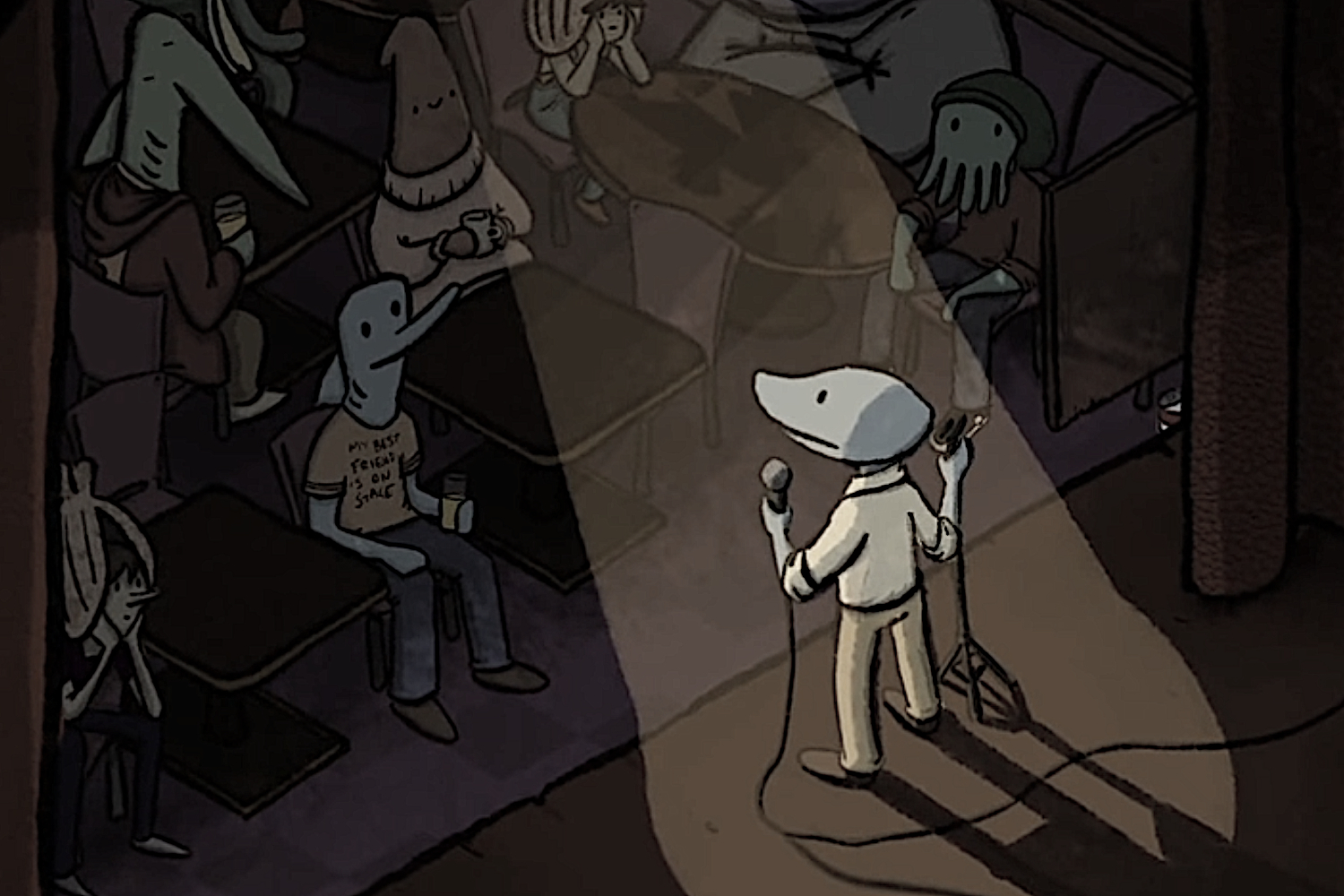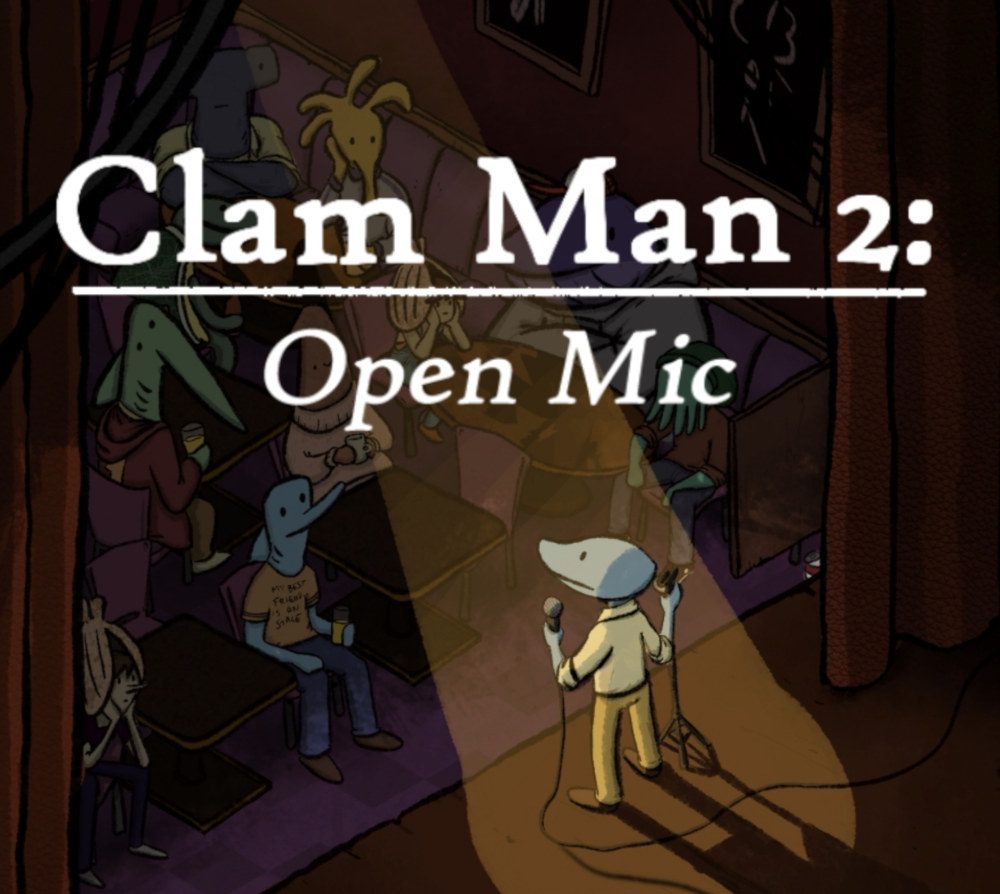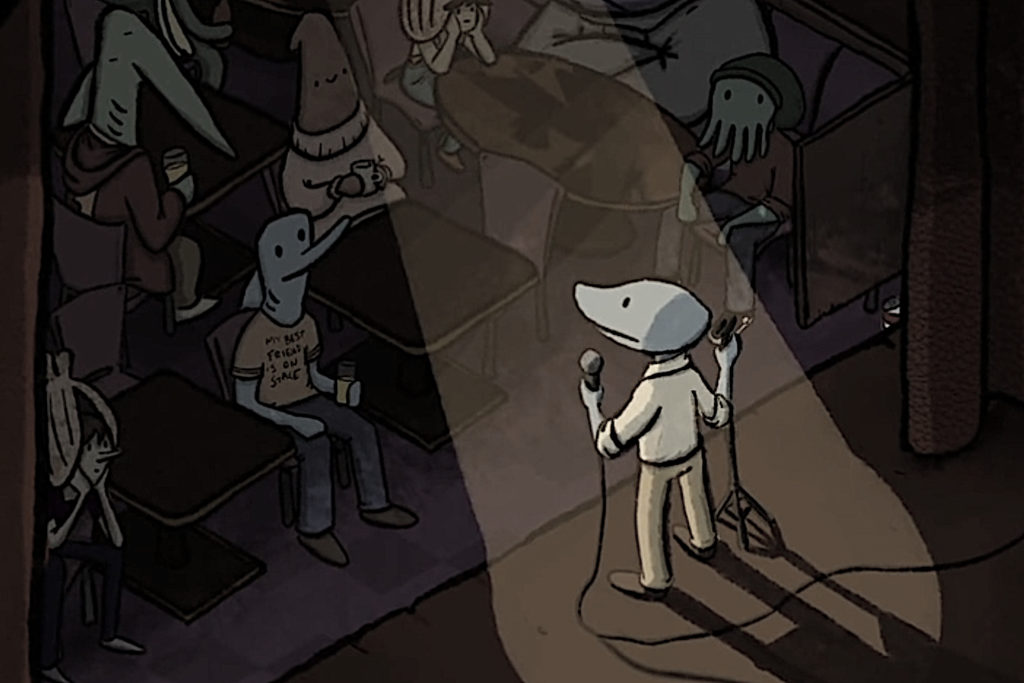
>>> For the German version of this article click here <<<
Clam Man 2: Headliner is the ideal mix for both video game and stand-up nerds: a role-playing game about stand-up in which „where jokes are loot and comedy shows are boss fights“. The prologue Open Mic is now available for free to play and download on Itch (and, starting June 19th, also on Steam). The special thing about Clam Man 2: There is only one single developer behind the game, the 27-year-old programmer and designer Martin Hanses, who lives in Montreal, Canada. In the interview, he explains how he transferred his personal insights into stand-up comedy into a game system with quests, levels and skill points.
Setup/Punchline: Martin, quite at the beginning of the game, Clam Man and his boss discuss what is the most important ingredient of a burger. Is it the pickle, the patty, the tomato, the roll? Writing that kind of nonsensical stuff must be hilarious in a team. How do you do that all alone?
Martin Hanses: Yes, that is the very hard part. Comparing that to Clam Man 1, when we were a whole group of developers and authors, you could sit down and write a joke and then quickly message it to the colleagues for feedback. Now I’m on my own. And it’s literally just me trying to make myself laugh.
How does that work out?
Oh, I simply try to think of jokes that crack me up. So I’m looking for things that are so weird that they take me by surprise. As it turns out, it is really hard to surprise yourself. But the fail checks are really helping.
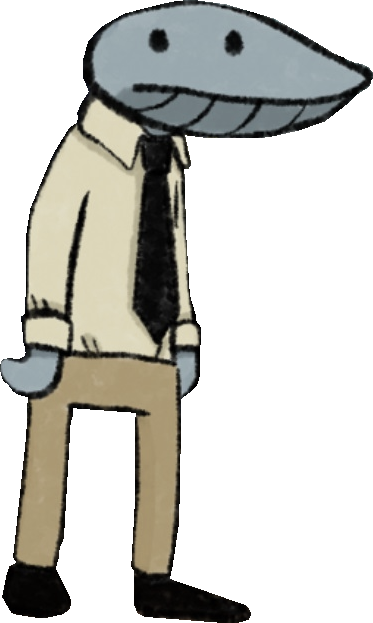
THE CLAM MAN UNIVERSE
Clam Man is a loveable office idiot with a clam for a head. The first part of the game was released in May 2019 and was inspired in gameplay and humor by classic point-and-click adventures such as Monkey Island and Sam&Max: Hit the road. At that time, developer Martin Hanses was part of a crowd financed team. On Clam Man 2 he works alone and at his own expense. And he changed genres, Clam Man 2, though combatless, is heavily influenced by the older parts of the (very brutal, but also very funny) Fallout series and the 2019-hit Disco Elysium. Fun fact: The maritime setting stems from the fact that Hanses, as he says, simply cannot draw people.
The fail checks are the instances of the game when one of your skills is put to the test. Like rolling the dice for a certain number in a pen-and-paper game.
Writing those is a big fun part of the game. If you pass the test, let’s say, in your detection skill, you’ll probably notice something that makes the game easier. But quite more interesting are the cases when you mess things up, when you fail critically. As a writer I have to think of silly things that happen next. As the player, failing the checks will take you longer, but I prefer failing. If you mess up, you’ll get more fun out of it.
You call Clam Man 2 a role-playing game (RPG) and, besides, a „combatless, narrative adventure“. Why was it important to you to stress that it is combatless?
Maybe RPG is not the perfect label for it. But it certainly does have characteristics of an RPG. Not only because it was influenced by Fallout 1&2, but also because the protagonist has stats and skills you can level up and you have skill checks. Many people will associate the term „RPG“ with the classics of the genre: games like Diablo, Baldur’s Gate or Fallout, that means, mostly games that rely heavily on combat. Clam Man 2 is not like that, that is what I want people to understand right away.
Why not, actually? Combat in RPGs seems quite a success story. And you even call comedy shows „boss fights“…
You could do that, of course, letting be comedian and audience opponents. And a joke is creating, like, „five laughing damage“. But that would just have been a reskin of combat with new names, and that didn’t quite fit in the game’s comedic world. I wanted to focus on quests and narrative. You could probably call it a „choices-matter“-game.
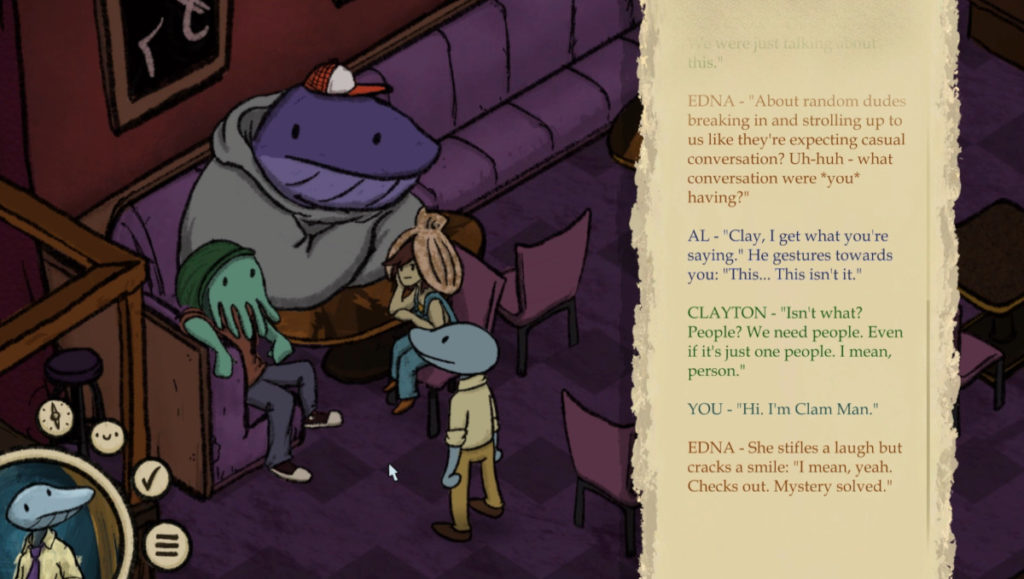
During the first hour of the game very disparate kinds of humor are mentioned: stand-up and impro comedy, late night shows, as well as memes, subs or even folk wisdoms like „Laughter is the best medicine“. Painting a huge panorama of contemporary humor, is this something you wanted to achieve?
Definitely, but with an emphasis on stand-up maybe. For instance, take the three characters who run the comedy club in the game. They represent three different schools of comedy, three main fractions you can align yourself with: observational, physical and absurdist comedy. It’s an oversimplification, of course, and no comedian is 100 percent one type.
How did you come up with these categories?
„People sometimes
regard physical comedy
as something lesser.
But it’s sneaking back in.“
Every person finds different things funny. I was wondering: Why do they find the things they find funny funny? And it comes down to one of those kinds of humor most of the times. With observational I mean detecting little details about our daily lives, like maybe Seinfeld. Absurdist would correspond more to Eddie Izzard. And for physical, just think of someone like Jim Carrey. People sometimes regard physical comedy as something lesser. The modern or post-modernist kind of comedy often cringes at comedians who use their bodies a lot. There has been a shift towards more aphysical comedy, but it’s sneaking back in.
Take Bill Burr’s latest special Paper Tiger. He has this story about the guy jumping off a helicopter. That is completely physical, and that’s the reason this works so well. He is moving his head, he is acting out, miming all these things. In general: Also dead-pan delivery, when the comedian looks like he doesn’t finds it funny, is physical comedy. But like I said, no-one is 100 percent one type. Steven Wright, for instance, has these observational jokes that are also a little absurdist. But he also looks like he has a headache all the time and he has this voice: He has a huge physical presence.
The comedians‘ skills in the game are improv, detection, self-awareness and the inclination to use one’s body what you call „aquadynamics“ because of the maritime setting of the game. Does this skillset reflect your personal take on stand-up?
I was thinking about this a lot. I sat down a couple of nights and watched a ton of stand-up and wrote down everything that came to my mind. The goal was to reach the fewest possible skills that are needed by comedians and that, with different distribution of skill points, yield to those different stand-up genres I mentioned. Detection and aquadynamics are quite self-explanatory. Improv is the ability to think of something off the top of your head. That also comes in handy when dealing with hecklers. And self-awareness is the awareness of the emotions of yourself and of others. That is also the skill that makes the comedians most different.
What do you mean by that?
Take Bill Burr one more time. He is sort of observational, then goes into the absurd to mock reality or what he perceives reality to be. But his way of doing so is very different to, let’s say, John Mulaney’s. Burr is angry, aggressive and says „This is bullshit“. Mulaney is kinder, sweeter and sort of more ironic, more self-aware. In my opinion, that is where that difference comes from.
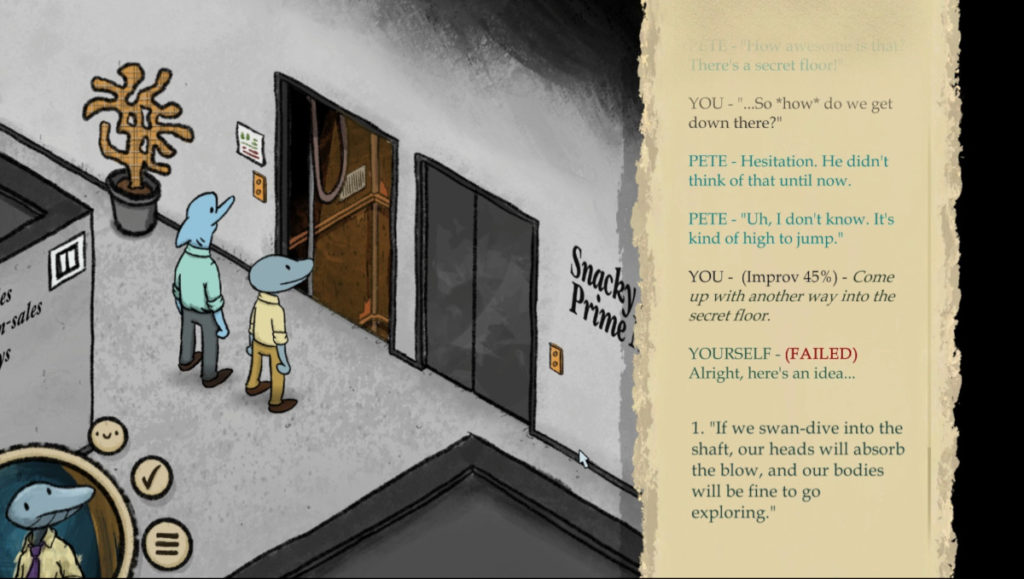
Did you have other skills you had to get rid of?
I think I had one or two others. Confidence, for instance. But I worked that into self-awareness.
How did you learn to write jokes? Are you a comedian yourself?
I used to do stand-up for a short period some time ago, and it was a lot of fun. But I think I stopped because it was too much pressure for me to constantly come up with new stuff. At that point I didn’t realize that comedians are playing a set that they build, perfect and own. So i stopped, but stand-up is something I care and think about a lot. They always say: Write about what you know. I’m a stand-up nerd, so I write about stand-up.
So you probably know a lot of comedians you can run the jokes for the game by?
Actually, no. I lost touch with any stand-up comedians. But I know a lot of funny people. We all have senses of humor. Your sense is so much dictated by who you’re. An old friend can just say one unfunny word to you, out of context, and it makes you laugh nonetheless. Just because it reminds you of a shared experience. And the awareness of the both of you is enough to crack you up.
